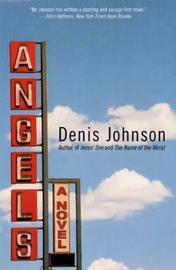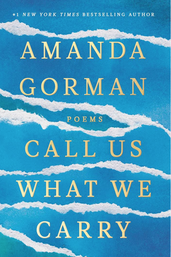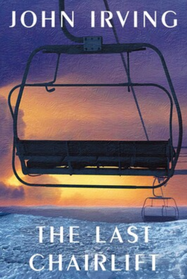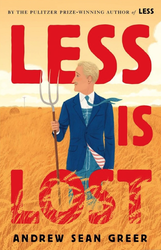Whether you are inspired or not, the only way to unlock your creativity, is to start writing. |
THURS: A Writer's Wit | Christopher Lasch
FRI: My Book World | Nancy Loe, Hearst Castle: An Interpretive History of W. R. Hearst's San Simeon Estate
Coming Next:
THURS: A Writer's Wit | Christopher Lasch FRI: My Book World | Nancy Loe, Hearst Castle: An Interpretive History of W. R. Hearst's San Simeon Estate
0 Comments
Coming Next:
WEDS: A Writer's Wit | Jane Green THURS: A Writer's Wit | Christopher Lasch FRI: My Book World | Nancy Loe, Hearst Castle: An Interpretive History of W. R. Hearst's San Simeon Estate
My Book World Johnson, Denis. Angels: A Novel. New York: HarperCollins, 2002 (1977). I wouldn’t have thought of these words, but a blurb located on the back of the book describes the novel as being about two born losers. And I believe that is the case, unfortunately. A poor woman with two small children meets a divorced man, and they wind up in Phoenix. In the desert city, after mishaps with drugs, the woman finds herself in rehab, on the path toward a new life. The man and his two brothers, however, make a plan to rob a bank, believing their idea is brilliant. The heist, of course, goes awry, and the man winds up in prison killing someone. The account of his execution may be one of the most realistic and chilling scenes I’ve ever read in fiction. Angels makes a fine title on several levels of irony. TUES: A Writer's Wit | Colm Tóibín WEDS: A Writer's Wit | Jane Green THURS: A Writer's Wit | Christopher Lasch FRI: My Book World | Nancy E. Loe, Hearst Castle: An Interpretive History
Coming Next:
FRI: My Book World | Denis Johnson, Angels TUES: A Writer's Wit | Colm Tóibín WEDS: A Writer's Wit | Jane Green THURS: A Writer's Wit | Christopher Lasch
Coming Next:
WEDS: A Writer's Wit | Elsa Maxwell THURS: A Writer's Wit | Bennett Cert FRI: My Book World | Denis Johnson, Angels
My Book World Gorman, Amanda. Call Us What We Carry: Poems. New York: Viking, 2021. This collection of poetry may be the most innovative one I’ve ever read—quite fitting for one of our youngest and most distinguished poets. Gorman uses a wide variety of poetic forms. Concrete poetry portrays Melville’s whale, and a poem about the Covid Pandemic is a black mask with white print. She devises a series of free forms fitting the subject matter. Yet others are truly novel, for example, in “The Soldiers (or Plummer),” in which her lines representing a young soldier’s diary appear as dated diary pages. The poet seems to be telling the broad sweep of African-American history by searching out every appropriate form and by sweeping out every ignored corner of said history. One reading, as with most fine poetry, will not be enough. And I look forward to Gorman’s next collection. TUES: A Writer's Wit | Margaret Wise Brown WEDS: A Writer's Wit | Elsa Maxwell THURS: A Writer's Wit | Bennett Cerf FRI: My Book World | Denis Johnson, Angels
Coming Next:
FRI: My Book World | Amanda Gorman, Call Us What We Carry TUES: A Writer's Wit | Margaret Wise Brown WEDS: A Writer's Wit | Elsa Maxwell THURS: A Writer's Wit | Bennett Cert
Coming Next:
THURS: A Writer's Wit | Diane Duane FRI: My Book World | Amanda Gorman, Call Us What We Carry
Coming Next:
WEDS: A Writer's Wit | Robert Surtees THURS: A Writer's Wit | Diane Duane FRI: My Book World | Amanda Gorman, Call Us What We Carry
My Book World Irving, John. The Last Chairlift: A Novel. New York: Simon, 2022. I’m a big fan of most of Irving’s early and mid-career books, including his nonfiction. I loved reading Garp, Hotel New Hampshire, and A Prayer for Owen Meany. I had to begin the latter three times until it finally ensnared me and I couldn’t put it down. Perusing The Last Chairlift, sadly, is not like that. I read this book aloud to my partner evenings over a period of three months. I kept waiting for Irving’s Dickensian afterburner to kick in at about page 100, that thrust that would propel us to the end. It did not engage, not for me anyway. Almost nine hundred pages seems too long for a contemporary novel, I believe. It might have been better served to come in at four or even five hundred pages. Why? For one thing, there is too much of a certain kind of repetition. Normally, I like some recapitulation, little wrap-ups of or references to earlier events to remind readers what has come before. However, in this novel, Irving has an annoying habit of attaching endearing monikers like the little snowshoer to characters instead of using the character’s name (and his practice seems clunky compared to the Russians who do this rather well). Of course, he alternates their usage with their real name at times, but by the time he does, one forgets who the little snowshoer is . . . or was. And did someone say ghosts? A few of the characters die along the way (the novel does cover quite a life span), but do they? They keep reappearing as ghosts, but Irving doesn’t have much of a mechanism for readers to grab onto. We’re just supposed to know it. Rather than being led to believe this is some kind of flashback, it is really encounters with ghosts we’re having. I will accept responsibility for sloppy reading, but I’m not sure it’s all my fault. Or are ghosts merely an easy, perhaps sloppy, representation of how the main character misses the people in his life who die? Finally, Irving has a careerlong fascination with a number of images or motifs: bears or people in bear costumes, an almost homoerotic fascination with wrestling, and also, among others, a perhaps erotic fascination with trans people (and a son who accepts his trans mother, see The World According to Garp). This novel is populated with trans people, yet I never get the sense that Irving has a real feel or understanding of them. There is not enough information present on the page for readers to believe he knows what he’s talking about: complex physical and psychological transformations, surgical or other medical procedures, the emotional angst that must come with such metamorphoses. And always, I wonder why he avoids other LGBTIQA+ iterations, mostly the G one (except for a lesbian couple who must be the last vestige of vaudeville, appearing nightly in Two Dykes, One Who Talks, har har har). Just saying. It seems that Irving may have wished for this book to be his swan song, and he puts his entire heart and snippets of every motif from his entire oeuvre and mixes them all into a fine pea soup with not a little ham. I don’t know about others, but as I finished this go-around with the latest Irving novel, I could only stomach so much of this rich pea soup. And only so much ham. Coming Next: TUES: A Writer's Wit | Jean Hanff Korelitz WEDS: A Writer's Wit | Robert Surtees THURS: A Writer's Wit | Diane Duane FRI: My Book World | Amanda Gorman, Call Us What We Carry: Poems
Coming Next:
FRI: My Book World | John Irving, The Last Chairlift TUES: A Writer's Wit | Jean Hanff Korelitz WEDS: A Writer's Wit | Robert Surtees THURS: A Writer's Wit | Diane Duane
Coming Next:
THURS: A Writer's Wit | Benjamin Dreyer FRI: My Book World | John Irving, The Last Chairlift
Coming Next:
WEDS: A Writer's Wit | Ariel Durant THURS: A Writer's Wit | Benjamin Dreyer FRI: My Book World | John Irving, The Last Chairlift
My Book World Greer, Andrew Sean. Less Is Lost. New York: Little, 2022. My only criticism of Greer’s first novel in this series, Less, was that readers had to play a guessing game as to whom the narrator was. I felt there were some problems with that mechanism (see my complete profile). Why not just write the narrative in third person? I asked at the time. Less’s lover, Freddy Pelu, could not possible know some of the things Less had experienced. At least, that is what I reasoned. In this novel, Freddy Pelu is an openly open gay narrator, Less’s partner (the one he finally winds up with in the first novel). And yet, his similar narration of this novel sets up different but similarly disturbing questions: 1) Since the two men are once again separated, we don’t see them together. Less is on an extended book tour, attempting to scare up extra money, Freddy off somewhere else. 2) Again, Freddy seems to be narrating Less’s story about the death of Less’s previous lover. Is he actually there to witness all of Less’s torments? 3) Why even have a partner if Less is not even going to engage with him, the least of which would be coitus? Still, as a summer beach read, Greer’s mixture of apt literary allusions and familiarity with pop culture, the novel is not disappointing. It kept me reading right to the very end when Less, after crisscrossing the USA—combining literary lectures with personal journey—finally meets up with Freddy (although it is only a good guess on the part of readers). If Greer squeaks out a sequel, I do hope that, even if Freddy narrates this one, too, that readers will experience the partners being in the same room! Coming Next: TUES: A Writer's Wit | Sophie Scholl WEDS: A Writer's Wit | Ariel Durant THURS: A Writer's Wit | Benjamin Dreyer FRI: My Book World | John Irving, The Last Chairlift
Coming Next:
FRI: My Book World | Andrew Sean Greer, Less Is Lost TUES: A Writer's Wit | Sophie Scholl WEDS: A Writer's Wit | Ariel Durant THURS: A Writer's Wit | Benjamin Dreyer
Coming Next:
WEDS: A Writer's Wit | Reza Aslan THURS: A Writer's Wit | Anna Olson FRI: My Book World | Andrew Sean Greer, Less Is Lost |
AUTHOR
Richard Jespers is a writer living in Lubbock, Texas, USA. See my profile at Author Central:
http://amazon.com/author/rjespers Archives
June 2024
Categories
All
Blogroll
Websites
|